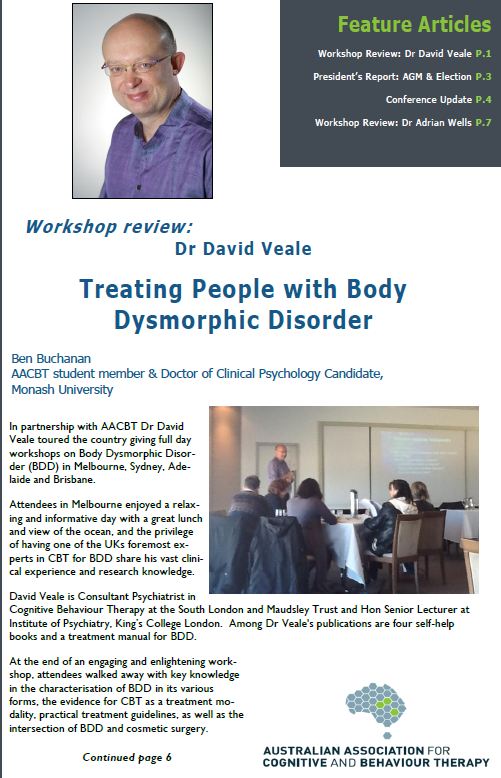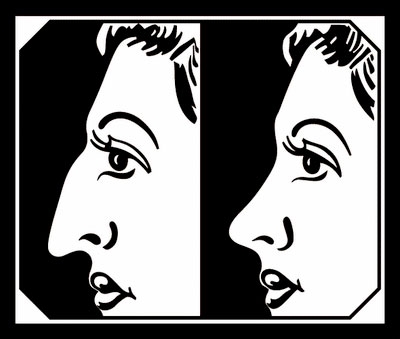
Review of Dr David Veale’s AACBT 1-day Workshop:
9th September 2012
By Ben Buchanan
In partnership with Australian Association for Cognitive and Behaviour Therapy (AACBT) Dr David Veale toured the country giving full day workshops on Body Dysmorphic Disorder (BDD) in Melbourne, Sydney, Adelaide and Brisbane. Attendees in Melbourne enjoyed a relaxing and informative day with a great lunch and view of the ocean, and the privilege of having one of the UKs foremost experts in CBT for BDD share his vast clinical experience and research knowledge.
David Veale is Consultant Psychiatrist in Cognitive Behaviour Therapy at the South London and Maudsley Trust and Hon Senior Lecturer at Institute of Psychiatry, King’s College London. Among Dr Veale’s publications are four self-help books and a treatment manual for BDD.
At the end of an engaging and enlightening workshop, attendees walked away with key knowledge in the characterisation of BDD in its various forms, the evidence for CBT as a treatment modality, practical treatment guidelines, as well as the intersection of BDD and cosmetic surgery.
Dr Veale highlighted that BDD is an under-diagnosed mental disorder, as many people with the disorder are so embarrassed about their body image concern that they are unlikely to disclose them. Instead, individuals with BDD are more likely to present to mental health settings with depression, social anxiety or OCD, so Dr Veale recommended asking patients directly about preoccupation with their looks, even if patients do not initially volunteer body image concerns. Key diagnostic criteria include a preoccupation with an imagined defect in appearance, often revolving around the face or skin, where the rituals or social anxiety associated with worrying about their looks significantly impacts on an individual’s daily living.
While individuals with BDD generally look normal, Dr Veale explained that clinicians will have little success trying to directly use evidence to demonstrate this “fact”. Instead, targeting the over-valued nature of these beliefs is more effective, where a reduction in the idealised value in how one looks is likely to considerably reduce the dysfunction associated with Body Dysmorphic Disorder. The daily rituals and safety behaviours present in BDD, such as mirror checking or camouflaging the perceived defect with makeup, are also effective targets for treatment. Overall, research evidence has shown that CBT techniques are an effective treatment for BDD.
“a reduction in the idealised value in how one looks in likely to considerably reduce the dysfunction associated with Body Dysmorphic Disorder “
Instead of presenting to mental health settings, about half of those with BDD seek cosmetic surgery or dermatological treatments. Dr Veale suggested that there is a growing body of evidence showing that BDD should be considered as a contraindication for surgery, as individuals with BDD generally do not gain any psycho-social benefit from the procedures, with many experiencing an increase in BDD symptomatology after surgery.
Instead, Dr Veale advocated for the so called “psycho- rhinoplasty”, where patients with BDD participating in CBT draw an image of themselves before and after treatment, often with striking differences!
Overall, this one day workshop was time well-spent, providing clinicians with the opportunity to increase their capacity in recognising and treating this under-acknowledged and debilitating disorder.


